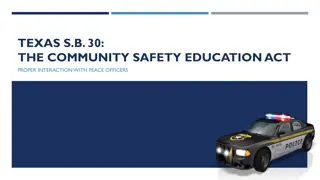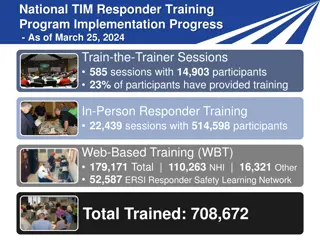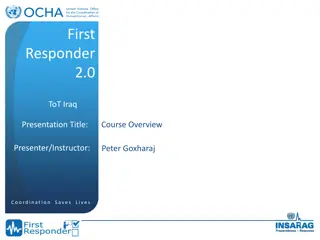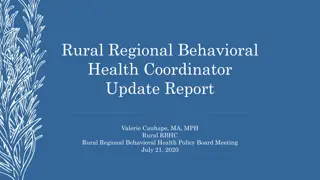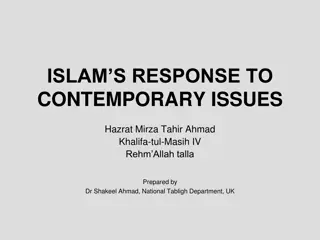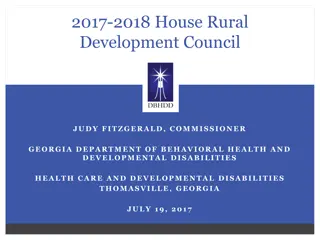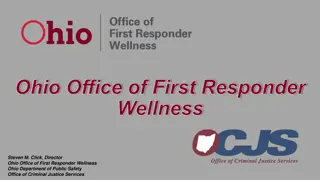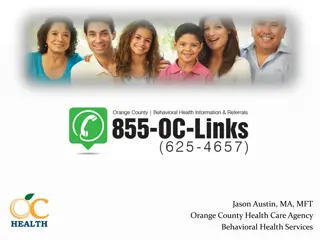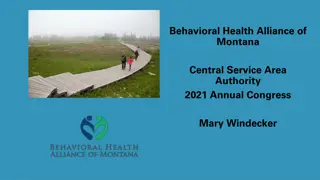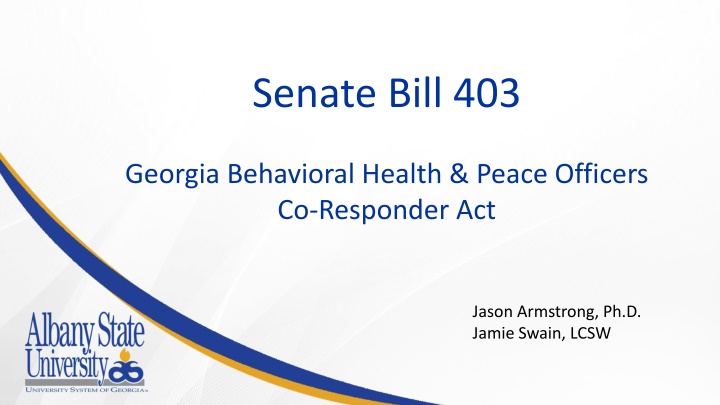
Georgia Behavioral Health & Peace Officers Co-Responder Act Details
Senate Bill 403 passed in June 2022 aims to establish collaborative relationships between law enforcement and mental health professionals to improve outcomes for individuals with mental/behavioral health issues. The bill reduces force liability, calls for behavioral health crises, incarceration rates, and resource strain while enhancing collaboration, access to services, tracking, and community partnerships. Community Service Boards are tasked with establishing co-responder programs, with law enforcement roles varying based on partnership status. Prior to and after formal partnerships, law enforcement responsibilities include designating officers, facilitating access to records, and reporting incidents to the Department of Behavioral Health & Developmental Disabilities.
Download Presentation

Please find below an Image/Link to download the presentation.
The content on the website is provided AS IS for your information and personal use only. It may not be sold, licensed, or shared on other websites without obtaining consent from the author. If you encounter any issues during the download, it is possible that the publisher has removed the file from their server.
You are allowed to download the files provided on this website for personal or commercial use, subject to the condition that they are used lawfully. All files are the property of their respective owners.
The content on the website is provided AS IS for your information and personal use only. It may not be sold, licensed, or shared on other websites without obtaining consent from the author.
E N D
Presentation Transcript
Senate Bill 403 Georgia Behavioral Health & Peace Officers Co-Responder Act Jason Armstrong, Ph.D. Jamie Swain, LCSW
Senate Bill 403 Passed in June 2022: OCGA 37-11-1 through 37-11-13 Intent is to establish collaborative relationships between law enforcement and mental health professionals to better meet the needs of those suffering from mental/behavioral health issues, reduce incarceration, and collect data to improve future outcomes
Why Senate Bill 403? Reduces: Use of force Liability Number of calls for Behavioral Health (BH) crises & recurrence Incarceration Strain on LE resources Costs to jails and prisons Increases: Collaboration with trained BH professionals Access to BH services Tracking Community engagement & partnerships
Community Service Boards (CSBs) are tasked with establishing co-responder programs. Law Enforcement mandates vary depending on whether or not a formal co-responder team and partnership is been established.
Prior to a Formal Co-Responder Partnership or No Co-Responder Partnership, Law Enforcement .. MAY partner with the CSB to establish co-responder team(s) MUST designate one peace officer to review behavioral health incidents and serve as the primary point of contact with the CSB MUST provide CSB team members with access to requested non- restricted records and provide access at mutually convenient times, for the purpose of facilitating the CSB team member s analysis of the individual MUST maintain and indicate on incident reports whether an incident arose from a behavioral health crisis and whether a co-responder team was dispatched and make incident reports available to the Dept. of Behavioral Health & Developmental Disabilities (DBHDD) *Access to records and reporting continues post partnership
After Establishing a Co-Responder Partnership, Law Enforcement .. SHALL designate one or more peace officers to participate as team members in a co-responder team Designate a peace officer to serve on the co-responder protocol committee MAY elect to receive crisis intervention training approved by GPOSTC Communications officers and individuals with dispatch responsibility shall receive training to identify BH crises and determine appropriate response units
After Establishing a Co-Responder Partnership, Law Enforcement .. Communications officers and individuals with dispatch responsibility will notify the co-responder team in the jurisdiction of the emergency, regardless of whether peace officers are dispatched MAY consider input from the CSB member in determining if treatment or an arrest is warranted, but decisions ultimately rest with the officer or his/her supervisor
Community Service Board Mandates Establish a co-responder program or offer consultation to officers responding to emergency BH calls Establish a co-responder protocol committee to increase efficiency, effectiveness, and best practices of teams Accompany officers on emergency BH calls or be available by phone or virtually during the call once the co-responder program is established Offer voluntary outpatient therapy to eligible individuals Employ or contract with licensed BH professionals to provide counseling and other support services
Community Service Board Mandates Cont Designate a sufficient number of staff to partner with LE agencies within the CSB service area with on-call availability at all times Maintain and provide LE with written lists of emergency receiving facilities Be trained on LE agency s operations, policies, and procedures Follow up with individuals within two days of the BH crisis regardless of insurance coverage or ability to pay regardless of arrest
Community Service Board Mandates Cont Identify appropriate services and sources including job placement and housing May make recommendations for jail release plans May review and request access to arrest and incarceration records to provide written recommendations for consideration Document each incident of co-responder team responses Maintain a database or file and forward to DBHDD as requested
GA Department of Behavioral Health & Developmental Disabilities Provide funds for the training of LE, Communications Officers, and CSB team members Compile reports and data from LE and CSB s Establish a database for access of records to assist teams throughout the state even when individuals relocate within the state Submit budget requests to support the bill and teams
Other updates Immunity for the transport of a patient to a facility (OCGA 37-3-4 & 37-7- 5) Transports must occur in government-owned vehicles configured for safe transport based on the individual's condition (37-11-9) LE may authorize an alternative medical transport company or otherwise if deemed safe for the individual All training undertaken in accordance with 37-11-6 shall be provided at the expense of the GA Dept of BHDD and at no expense to any law enforcement agency, public safety agency, or CSB. CIT for co-responder team members Communication officer training on BH crises CSB training on police operations, policies, & procedures
Questions? Dr. Jason Armstrong, Associate Dean/Criminal Justice faculty 229-500-2376 Jason.armstrong@asurams.edu Professor Jamie Swain, Social Work faculty 229-500-2385 Jamie.swain@asurams.edu

